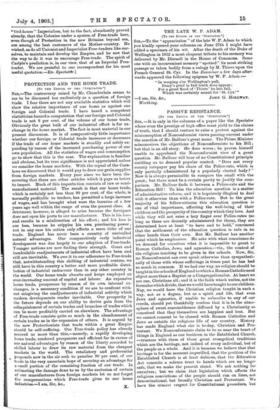PROTECTION AND THE HOME TRADE. [TO THE EDITOR OF THE
"SPECTATOR."] Sur,—The controversy raised by Mr. Chamberlain seems to me to be discussed too exclusively as a question of foreign trade. I fear there are not any available statistics which will show the relative importance of our home as against our foreign and Colonial trade. I have heard a competent statistician hazard a computation that our foreign and Colonial trade is not 8 per cent. of the volume of our home trade. Obviously the great bulk of our industrial effort is for ex- change in the home market. The fact is most material in our present discussion. It is of comparatively little importance whether our foreign or Colonial trade increases or decreases if the trade of our home markets is steadily and safely ex- panding by reason of the increased purchasing power of our own population. All the statistics of wages and consumption go to show that this is the case. The explanation is familiar and obvious, but its true significance is not appreciated unless we consider the home markets. With the repeal of the Corn- laws we discovered that it would pay to draw our grain supplies from foreign markets. Every year since we have been dis- covering that there are other articles which it pays us better to import. Much of this importation consists of raw or semi- manufactured material. The result is that our home trade, which is certainly not leas than 90 per cent, of the whole, is normally profitable to traders, has permitted a large increase of wages, and has brought what were the luxuries of a few years ago well within the range of even the poorest class. A detriment, however, is alleged to arise because the foreigner does not open his ports to our manufactures. This is his loss, and results in a misdirection of his effort ; and his loss is our loss, because he cripples his own purchasing power ;
but in any case his action only affects a mere tithe of our trade. England has never been a country of unrivalled
natural advantages. Our comparatively early industrial development was due largely to our adoption of Free-trade. Younger nations are now finding their strength. Great and incalculable readjustments of industrial effort have been and still are inevitable. We owe it to our adherence to Free-trade that, notwithstanding this shifting of industrial centres, we still have in this country a better and more profitable distri- bution of industrial endeavour than in any other country in the world. Our home trade absorbs and keeps employed an ever-increasing amount of capital and labour. An expansive home trade, prosperous by reason of its own internal ex- changes, is a necessary condition if we are to confront with- out misgiving the readjustments of industrial activity which modern developments render inevitable. Our prosperity in the future depends on our ability to derive gain from the relinquishment of certain trades and branches of trades which can be more profitably carried on elsewhere. The advantage of Free-trade consists quite as much in the abandonment of certain trades as in the expansion of others. It is argued by the new Protectionists that trade within a great Empire should be self-sufficing. Our Free-trade policy has already secured us more than this,—namely, a rapidly developing home trade, rendered prosperous and efficient far in excess of our natural advantages by reason of the liberty accorded to skilled labour to draw its raw material from the cheapest markets in the world. The retaliatory and preferential proposals now in the air seek to penalise 90 per cent, of our
trade in the very uncertain hope of securing an advantage for a small portion of the -remaining fraction of our trade. In estimating the damage done to us by the exclusion of certain of our manufactures from foreign markets let us not forget the compensations which Free-trade gives to our home industries.—I am, Sir, &c., 1.










































 Previous page
Previous page